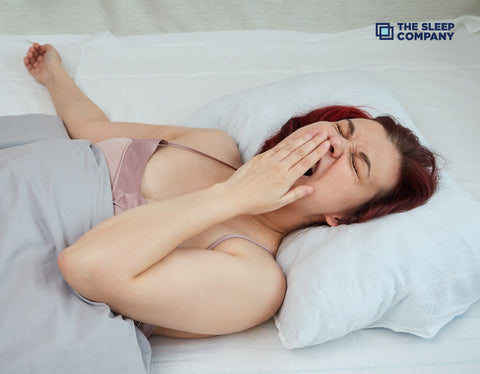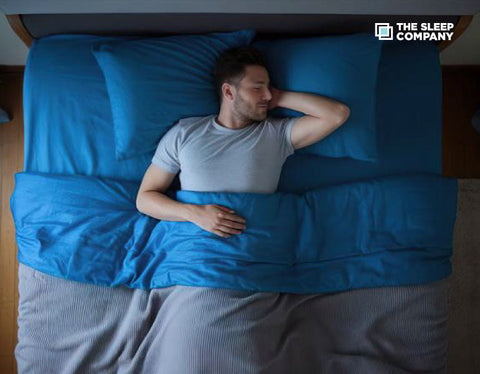My Cart

Sleep’s Influence on Hair Quality


Long, beautiful, silky hair is an external beauty norm. And, everyone makes lots of efforts to maintain them from the core of their heart. For that, they use thousands of remedies from traditional to modern, oils, shampoos, herbs, conditioners, massages, and what not.
However, like anything else, hair is also affected by many reasons, including sleep. Hair issues like falling, dandruff or thinning hairline are major stress givers for people across the world.
So to know how exactly sleep impacts hair and its growth, we must understand certain things. Such as,
What happens with hair overnight?
When we sleep, we all know our brain functions like repairing, restoring damaged cells, growth and other reproductive functions. It also includes hair growth and repairing hair follicles. Our hair follicles contain a maximum protein amount, and when we sleep, our body’s protein building and production reach their maximum level. And it works to repair, restore, strengthen and grow hair.
How does sleep affect hair?

Our sleep is a major benefactor in healing, restoring and active body functioning, including hair. There are many things related to sleep that hamper the quality of our hair. Such as,
Not enough sleep
One of the biggest reasons that our hair gets impacted is sleeping hours. When we don’t get those 7-9 hours of peaceful sleep, it creates many issues. Our brain functions get disrupted, which further hampers the procedure of hair restoration, repair and growth. Also, inadequate amounts of sleep lower the level of hormones.
Further, lack of sleep creates stress issues which enhance the possibilities of telogen effluvium, which is temporary hair loss.
Medications
Sleeping disorders are one of the common things that many of us face nowadays. And everyone who faces sleeping disorders goes through several treatments and medications that have side effects on health, including hair.
The chemical components in the medicines can cause abnormal growth of hormone levels, vitamins or protein levels. This inadequate growth of certain hormones can adversely impact our hair growth in the long term.
Sleeping style
Though sleeping style or position doesn’t have maximum impact on hair growth, it can cause damage or breaking of hair if the person has a habit of sleeping with lowered hair or changing position constantly.
Also, covering hair while sleeping with a bedsheet or anything else can cause hair damage. When our hair is covered, it doesn’t get enough air and becomes sweaty, further damaging hair.
Mattress, pillow material
Apart from sleeping habits, other external things that can damage your hair are the mattress or pillow material. Many people have mattresses and pillows with low-quality material; when we sleep on such a pillow or mattress, its rough texture and poor quality damage hair badly.
Find out your hair type
Before beginning any treatment, we must first find out certain things about our
- hair type- dry, oily or combination.
- The Natural pattern of hair- curly, wavy or straight.
- The density, volume, and length of hair.
- Its moisture absorbing level, porosity
- Any hair issues like dandruff, alopecia, psoriasis, or any other scalp conditions
Get the right products according to hair type
After determining the hair type and other related factors, it becomes easier to determine what type of products or treatments we can use to support the overnight restoration process of our body.
Many ancient to modern and scientifically proven products and treatments are available for hair care according to different hair types and their requirements.
Make dietary changes
Our food habits and diet also impact our hair quality. Therefore, consuming food that provides vitamins B12 and D, biotin, riboflavin, iron, and other nutrients valuable for hair growth is vital.
Apart from eating nutritional food, its quantity and timing also matter. Therefore, eating on time and inadequate portions becomes important for hair growth.
Use supplements
Sometimes eating the right nutritional food and sleeping on time are not enough due to excessive damage to hair follicles. Therefore, proteins become important with the doctor’s advice, taking supplements with Vitamin A, Tocotrienol, and Vitamin E.
Also, there are different ways to take supplements, like some that need to be consumed in tablet form while some are applied on the scalp externally.
Pre-bed routine
A pre-bed routine to maintain hair quality is vital. Using hair oils for scalp massage helps regulate blood flow in the head. Also, tying hair in loose knots or a braid prevents hair damage.
Change Mattress or Pillow
Another factor that helps greatly is using a mattress or pillow with good quality material. We must use a mattress or pillow with good material quality that does not heat our body and create night sweats. Also, they must be soft and smooth in feel for hair.
Use a silk pillow or mattress cover to prevent rough stimulation between hair and pillows or mattress.
Also, try the Sleep Company’s SmartGRID mattresses or pillows that don’t absorb body heat and maintain air circulation to prevent night sweats.
Exercise last but not least, exercises like Yoga and Acrobatics have a great hand in improving hair growth. It’s proven by many researchers that Yoga poses help regulate blood flow, induce growth hormones and reduce illnesses that affect hair growth.
Also, exercising helps you sleep peacefully and further regulates the hair restoration process during sleep.
Conclusion:
Our hair not only enhances our beauty but also works as a protector for our scalp and its skin. Therefore, it becomes vital to follow a strict hair care regime and get adequate sleep regularly.


































































